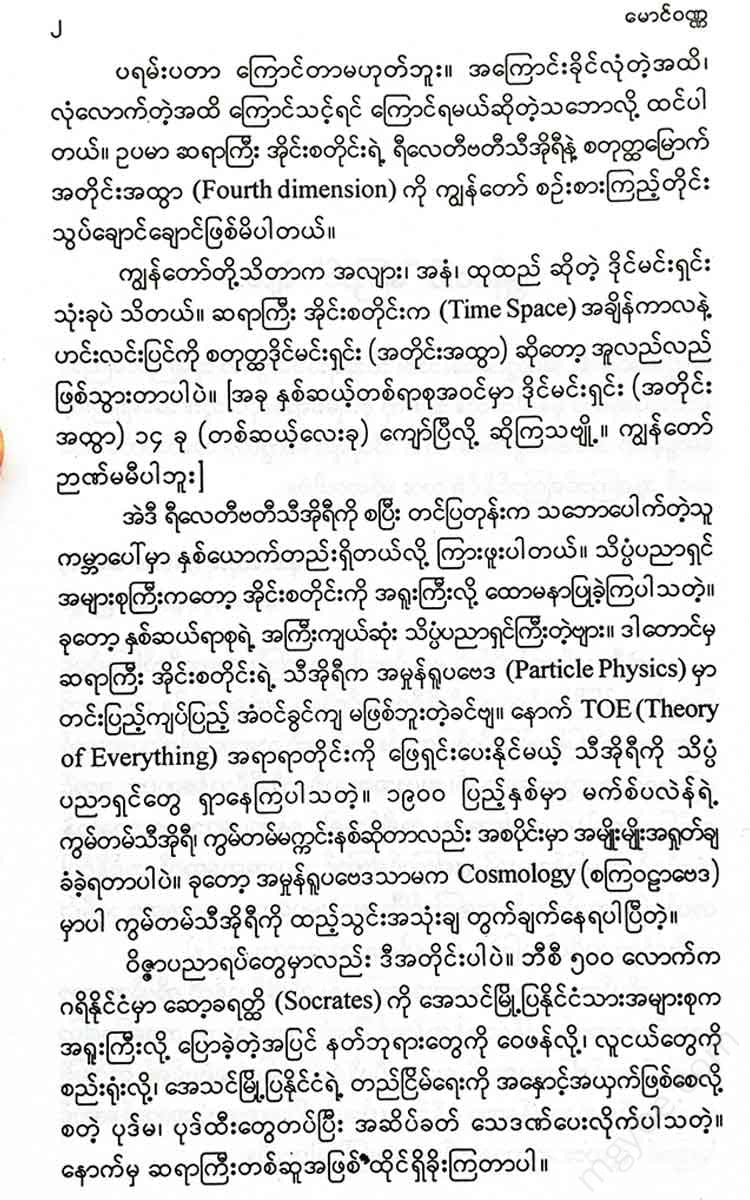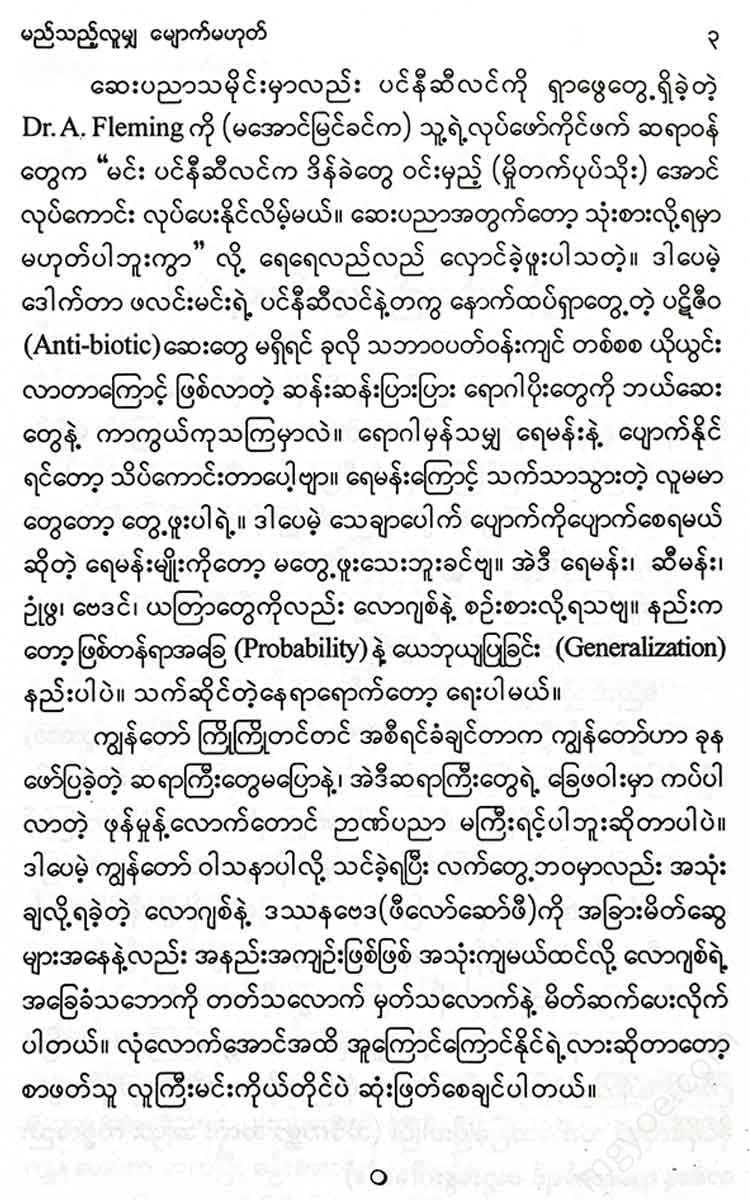စိတ်ကူးချိုချိုစာပေ
Maung Wunna - No one is a monkey
Maung Wunna - No one is a monkey
Couldn't load pickup availability
I am not a monkey.
First, I want to discuss the fact that no human is a monkey. This statement is simple. There is nothing wrong with it. If you think about it logically, it is like this.
All monkeys are animals.
No human is an animal.
Therefore, no monkey is a human.
To put it another way, no one is a monkey.
Our teachers taught us to think about any proposition (idea). If you agree, accept it temporarily. If you disagree, reject it temporarily. That's the summary. Why do we say temporary? What was considered wrong at one time may be right at another time, in another place, or under another circumstance.
Similarly, what was once considered true may be false in another time, place, or situation.
The most obvious example is that in ancient times, people believed that the Earth was flat. Now, scientists have conclusively proven that it is round. (We will discuss the issue of the flatness of the Earth in a later section.)
For now, let's just brainstorm a little about the fact that no human is a monkey.
Logic can make the simple confusing, but it can also make the very confusing clear.
(You've already started)
Charles Darwin said that humans evolved from a single species of ape, out of 193 species of monkeys, through a process of gradual development (evolution). Then, anthropologists , using archaeology, geology, physics, chemistry, zoology, and other disciplines, have explored and studied the evidence to show that humans, like monkeys, walked on all fours, climbed trees, and ate green fruits and insects, gradually became able to stand up, and then developed into humans.
But I forget about that evidence for a moment and say that humans did not evolve from apes. If I were to say that humans evolved from what I thought were low-level humans to what I thought were high-level humans, I would be criticized for how educated you are, how much you have studied, etc. But I like Einstein's thought experiment, which is about experimenting with thinking.
I read a book called The Naked Ape by Dr. Desmond Morris . In it, scientists discovered that the creature that would become humans was completely different from other monkeys and apes, and had only a thin layer of hair. So I kept thinking about it.
The answer is that humans did not evolve from apes. Instead, Charles Darwin argued that humans evolved from animals that were destined to become humans.
Are you great? How can you dare to deny Charles Darwin? I will answer simply. Why do you think for yourself? Even when Darwin's father says that Darwin did not exist, I do not believe him. (I will believe him if I want to believe him) I will answer that I want to use my own intelligence. (I will have to study hard to think like that.) If there is a great Darwin, I will be allowed to deny him. .
( Can you accept what I am presenting? It doesn't really matter if you don't accept it. We humans are descended from monkeys, part frog, part fish, and now we are humans. It is important to live as humans.)
That's what happened when I wrote this article. I think it's because others are pretending. If you don't know what you're talking about, don't be shy.
So, whatever the case, I would like to advise you to think about it a little.
Let's continue to see. Modern computers can do a lot of things. From calculating numbers to treating diseases, writing programs. They can do many other things that I don't know about. But a computer can't think like a human. (If you feed it data, it can. But the answers it comes up with are always wrong.)
Read a joke about it. A scientist invented a machine (computer) that could predict the future. Then, as a test, he asked the computer a question. “What will happen to me in the next hour?” The computer used the information (male) provided and various methods to calculate it. A day passed. Then it gave the answer. The answer was “You will sit and wait for my answer.”
If I asked someone if they were human, they would have to stitch my head up at least eight times. (That would be a relief.) But when we first started studying logic at university, the teacher, Daw Lili Phyu, wrote this on the blackboard.
Man is mortal .
Another one
Crows are black .
I got really dirty.
He just said all this, you already know. When I first learned this religion , I thought, "I must have been mistaken." Later, I gradually became interested. If there is death, can there be no immortality? If there is a black crow, can there be no white crow? I was interested in asking questions and finding answers. (This method of asking and answering questions was first used by the great philosopher Socrates. He said that a philosopher is like a gypsy.) Yes, logic can be used not only in daily life but also in religious thought. Think about the teachings of the Buddha about liberation from the cycle of birth and death, and about the immortality of the soul. According to the teachings of the Buddha, there is no rebirth. That is, if you are not born, you are not reborn. Why are we born? (Why are we suffering in samsara?) There is attachment. Craving. Craving. The four aggregates of attachment. According to the teachings of the Buddha, It is clearly stated that if one can eliminate attachment, craving, and attachment, one will not be reborn again. These are great and noble principles. Let us start with the simple.
Am I a "cat"?
It's true that new ideas, new thoughts, new theories can be disruptive. There's no need to worry about that. The important question is whether those new ideas, new theories can be disruptive enough.
Neils Bohr
Nobel Prize-winning physicist
I have never read that letter in English. I read it in the book Super String Theory compiled by the University Star. I liked it and reprinted it. As far as I understand, new ideas, new concepts, and new theories are considered crazy ideas when they are first introduced because they are not yet suitable for the situation, time, place, region, etc. (Really crazy and useless ones will be lost in the current of history as garbage.)
After thoroughly analyzing your own ideas, new thoughts, and new theories, you need to be brave enough to present them, no matter what anyone says (not just saying they're crazy, but saying they're crazy). You have to be able to take criticism. And it's also important to be "crazy" enough.
It's not a matter of chaos. I think it's a matter of whether it's true or false, as long as it's true enough. For example , whenever I think about Einstein's theory of relativity and the fourth dimension, I get a little confused.
We only know three dimensions: length, width, and volume. Einstein said that space and time are the fourth dimension, so it's confusing. Now, at the beginning of the twenty-first century, they say that there are more than 14 dimensions. I'm not smart.
When he first proposed the theory of relativity, I heard that there were only two people in the world who understood it. Most scientists considered Einstein a madman. Now he is the greatest scientist of the twentieth century. Even so, Einstein's theory did not fit perfectly into particle physics. Scientists are still looking for a theory that can solve everything, a TOE (Theory of Everything). In 1900, Max Planck's quantum theory, quantum mechanics, was initially criticized. Now, not only particle physics, but also cosmology ( cosmology) are using quantum theory to calculate.
The same is true of the arts. Around 500 BC, in Greece, Socrates was considered a madman by most of the citizens of Athens, and was sentenced to death by poison for criticizing the gods, corrupting the youth, and disturbing the peace of the city-state of Athens. Later, he was “worshipped” as a great teacher.
In the history of medicine, Dr. A. Fleming, who discovered penicillin , was ridiculed by his fellow doctors (before his success) saying, “Your penicillin might make cheese moldy. It’s not for medical use.” But without Dr. Fleming’s penicillin and other antibiotics, how would we have prevented and treated the strange diseases that have arisen due to the gradual deterioration of the natural environment? It would be great if all diseases could be cured with water. I have seen sick people who have recovered from water. But I have never seen a water that would definitely cure them. These water, cement, omens, and fortune-telling can also be considered logically. The method is based on probability and generalization . I will write when it is relevant.
I would like to state in advance that I am not as intelligent as the dust that sticks to the feet of the great teachers I mentioned above, let alone the great ones. However, I have studied logic and philosophy as a hobby and have been able to use them in real life, so I will introduce the basic concepts of logic to the best of my knowledge, in the hope that other friends will find them useful, at least in a small way. Whether you are able to understand them sufficiently is up to you, the reader, to decide for yourself.













